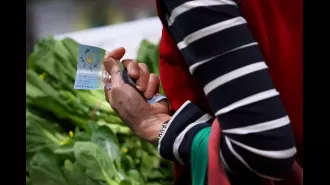"I lost £750,000 through gambling, yet lenders continued to loan me money. Why?"
Ali took out his first bank loan to fund his gambling addiction before he was eligible to vote.
November 22nd 2024.

When Ali was just nine years old, he became infatuated with the glimmering lights of the seaside amusement arcades. His parents would take him there every summer to play on the coin pushers, and he was immediately drawn to the thrill of watching the two penny pieces pile up and teeter on the edge, knowing that at any moment they could all come tumbling down and he could win big with 20p. As he grew older, this fascination only intensified, and by the time he was 11, he was already hooked on the excitement of a £2 jackpot. He would even go to the bookies with his dad to watch the morning dog racing and place bets on the afternoon TV races.
But it wasn't until he started receiving wages from his first job at the age of 16 that Ali's gambling habit truly took off. He would spend up to £40 a day in the arcades on the high street, unaware of the dangerous path he was heading down. Looking back, Ali realizes that the rush of dopamine he experienced with each win was a sign of a much bigger problem that would eventually consume his entire life, causing him to lose his home, his career, his relationships, and his mental health.
At just 17 years old, Ali wasn't even old enough to vote when he took out his first bank loan – a whopping £1,000 – to fuel his gambling addiction. Despite having a job, his habit quickly surpassed his wages, and he ended up refinancing the loan at least seven times over the next decade. Surprisingly, every time he asked for more money, the bank never questioned why he needed it.
Even as Ali's career in international banking took off and his income increased, so did his gambling. He even purchased a two-bedroom flat in Chigwell for £57,000, but soon found himself having to remortgage it. But his addiction wasn't just affecting his finances – it was also damaging his relationships. He would get irritated if his friends chose a pub without a fruit machine, and he would even turn off his phone while gambling so that nothing could distract him.
When Ali finally ran out of money 20 years ago, he sought help for the first time. A financial specialist from his church advised him to create a financial statement, and when he saw the numbers in black and white, he was shocked to realize that he was spending over £1,000 more per month than he was earning. Despite having creditors constantly hounding him for payment, Ali still believed that he could win back everything he owed through gambling.
In 2007, Ali refinanced all of his debt onto his mortgage, which increased from around £80,000 to £137,000. To his surprise, the bank didn't question his gambling and approved the application within an hour. This only fueled Ali's belief that he could continue to spend and gamble without any consequences.
By 2012, Ali was earning a substantial income from his job and receiving five-figure bonuses, but he had also accumulated a staggering £52,000 in credit card debt and loans. To cover his gambling expenses, he began taking out payday loans, which had no questions asked and required monthly repayments of up to £2,400. Despite receiving three large payouts – a five-figure redundancy package, a £70,000 inheritance, and £30,000 in PPI payments – Ali's addiction quickly consumed all of it and he was still in deep debt.
In 2016, Ali hit rock bottom and decided to sell his London flat and move to Scotland for a fresh start. He had to borrow £27,000 from a friend just to make it through the six months it took to sell his flat. The thought of losing his friend's money and facing repossession made Ali feel desperate and even suicidal.
Looking back on his journey, Ali now realizes the destructive power of gambling and how it can completely take over a person's life. He is not alone in this struggle, as a recent report has shown that harmful gambling has increased in the past year, with one in ten people spending over £1,000 per month on the habit. For Ali, it's a constant battle to stay away from gambling, but he knows that it's a fight worth fighting for the sake of his own well-being and the relationships that mean the most to him.
At just nine years old, Ali Robb was already drawn to the colorful lights of the amusement arcades by the seaside. His parents would take him there every summer, and he couldn't resist the allure of the coin pushers. Watching the two penny pieces pile up and hang on the edge, he knew that at any moment, they could all come tumbling down, leading to a big win of 20p. As he grew older, his fascination with gambling intensified, and by the time he was eleven, he was hooked on the thrill of a £2 jackpot. Soon enough, he was accompanying his dad to the bookies, eagerly waiting for his dad to place his bets while they watched the morning dog races and TV bets in the afternoon.
When Ali landed his first job in finance at sixteen, he started spending up to £40 a day in the high street arcades. Little did he know, those small wins were the first signs of a serious addiction that would eventually take over his entire life. It started innocently enough, and Ali doesn't blame his parents for it, but those dopamine hits that came with every win were the beginning of a downward spiral that would cost him his home, his career, his relationships, and even his mental health. Looking back, Ali, now 52, reflects on the devastation caused by his gambling addiction, saying, "The fact that I've lost so much of my life to gambling is devastating. It's not about the money; it's the way it's robbed me of living a normal life in every respect. It was all lost to the bright lights and the chance of a big win."
Even though he didn't realize it at the time, those small wins were just the beginning. At 17, Ali wasn't even old enough to vote when he took out his first loan of £1,000 from a high street bank to fuel his habit. Despite having a steady income, his gambling quickly outpaced his earnings, and he ended up refinancing the loan numerous times over the next ten years. Each time, the bank approved his request without questioning why he needed the money. By the mid-nineties, Ali was making a good salary at an international bank, but the more money he earned, the more he gambled. He even bought a two-bedroom flat in Chigwell for £57,000, only to have to remortgage it soon after.
But it wasn't just his finances that were impacted by his addiction. Even his friendships suffered as he became increasingly consumed by gambling. He would get frustrated if his friends chose a pub without a fruit machine, as his evenings were spent either playing on one or watching others play. He even turned off his phone when he was in front of a machine, not wanting anything to interrupt his gambling time. Reflecting on those days, Ali says, "When you're gambling, you feel like nothing else matters. If you come out losing, you feel rubbish, ashamed, and dirty for an hour or so, but then tomorrow is a new day. It's like you are on auto-pilot; there's a trigger in your head that makes you go back to try and win it back. You feel trapped, but you know you can hide it because there's always the chance of that big win."
His addiction also had a significant impact on his romantic relationships. Ali admits that his partners always took a backseat to his addiction, saying, "They came a very distant second." Despite the harm his gambling was causing, Ali didn't seek help until he ran out of money twenty years ago. A financial specialist at his church advised him to write a financial statement, and when he saw the numbers on paper, he was shocked. He was spending over £1,000 more per month than he earned, and despite creditors calling him at work multiple times a day, he still believed he could win back what he owed through gambling. In 2007, he managed to refinance all his debt onto his mortgage, which increased from £80,000 to £137,000 with no questions asked.
With his debt consolidated, Ali continued to gamble. By 2012, he was earning a substantial salary and receiving five-figure bonuses, but he had also racked up £52,000 in credit card and loan debt. To cover his gambling expenses, he started taking out payday loans, again with no questions asked, and had to make monthly repayments of up to £2,400. Despite receiving significant payouts, including a five-figure redundancy package, a £70,000 inheritance, and £30,000 in PPI payments, Ali's addiction quickly consumed it all.
By 2016, Ali was desperate and decided to sell his London flat and move to Scotland for a fresh start. He had borrowed £27,000 from a friend, which he spent in just six months while waiting for his flat to sell. He remembers the relief he felt when the flat finally sold, knowing that if it hadn't, he would have lost it and been unable to repay his friend. Looking back, Ali believes that without such easy access to credit cards and loans, he wouldn't have fallen so deeply into debt. Unfortunately, he's not alone in this struggle, as a recent report from direct lender Salad Money found that harmful gambling has increased in the past year, with one in ten people spending over £1,000 per month on gambling. For Ali, it took years of struggle and immense financial and personal loss before he finally sought help and started on the path to recovery.
But it wasn't until he started receiving wages from his first job at the age of 16 that Ali's gambling habit truly took off. He would spend up to £40 a day in the arcades on the high street, unaware of the dangerous path he was heading down. Looking back, Ali realizes that the rush of dopamine he experienced with each win was a sign of a much bigger problem that would eventually consume his entire life, causing him to lose his home, his career, his relationships, and his mental health.
At just 17 years old, Ali wasn't even old enough to vote when he took out his first bank loan – a whopping £1,000 – to fuel his gambling addiction. Despite having a job, his habit quickly surpassed his wages, and he ended up refinancing the loan at least seven times over the next decade. Surprisingly, every time he asked for more money, the bank never questioned why he needed it.
Even as Ali's career in international banking took off and his income increased, so did his gambling. He even purchased a two-bedroom flat in Chigwell for £57,000, but soon found himself having to remortgage it. But his addiction wasn't just affecting his finances – it was also damaging his relationships. He would get irritated if his friends chose a pub without a fruit machine, and he would even turn off his phone while gambling so that nothing could distract him.
When Ali finally ran out of money 20 years ago, he sought help for the first time. A financial specialist from his church advised him to create a financial statement, and when he saw the numbers in black and white, he was shocked to realize that he was spending over £1,000 more per month than he was earning. Despite having creditors constantly hounding him for payment, Ali still believed that he could win back everything he owed through gambling.
In 2007, Ali refinanced all of his debt onto his mortgage, which increased from around £80,000 to £137,000. To his surprise, the bank didn't question his gambling and approved the application within an hour. This only fueled Ali's belief that he could continue to spend and gamble without any consequences.
By 2012, Ali was earning a substantial income from his job and receiving five-figure bonuses, but he had also accumulated a staggering £52,000 in credit card debt and loans. To cover his gambling expenses, he began taking out payday loans, which had no questions asked and required monthly repayments of up to £2,400. Despite receiving three large payouts – a five-figure redundancy package, a £70,000 inheritance, and £30,000 in PPI payments – Ali's addiction quickly consumed all of it and he was still in deep debt.
In 2016, Ali hit rock bottom and decided to sell his London flat and move to Scotland for a fresh start. He had to borrow £27,000 from a friend just to make it through the six months it took to sell his flat. The thought of losing his friend's money and facing repossession made Ali feel desperate and even suicidal.
Looking back on his journey, Ali now realizes the destructive power of gambling and how it can completely take over a person's life. He is not alone in this struggle, as a recent report has shown that harmful gambling has increased in the past year, with one in ten people spending over £1,000 per month on the habit. For Ali, it's a constant battle to stay away from gambling, but he knows that it's a fight worth fighting for the sake of his own well-being and the relationships that mean the most to him.
At just nine years old, Ali Robb was already drawn to the colorful lights of the amusement arcades by the seaside. His parents would take him there every summer, and he couldn't resist the allure of the coin pushers. Watching the two penny pieces pile up and hang on the edge, he knew that at any moment, they could all come tumbling down, leading to a big win of 20p. As he grew older, his fascination with gambling intensified, and by the time he was eleven, he was hooked on the thrill of a £2 jackpot. Soon enough, he was accompanying his dad to the bookies, eagerly waiting for his dad to place his bets while they watched the morning dog races and TV bets in the afternoon.
When Ali landed his first job in finance at sixteen, he started spending up to £40 a day in the high street arcades. Little did he know, those small wins were the first signs of a serious addiction that would eventually take over his entire life. It started innocently enough, and Ali doesn't blame his parents for it, but those dopamine hits that came with every win were the beginning of a downward spiral that would cost him his home, his career, his relationships, and even his mental health. Looking back, Ali, now 52, reflects on the devastation caused by his gambling addiction, saying, "The fact that I've lost so much of my life to gambling is devastating. It's not about the money; it's the way it's robbed me of living a normal life in every respect. It was all lost to the bright lights and the chance of a big win."
Even though he didn't realize it at the time, those small wins were just the beginning. At 17, Ali wasn't even old enough to vote when he took out his first loan of £1,000 from a high street bank to fuel his habit. Despite having a steady income, his gambling quickly outpaced his earnings, and he ended up refinancing the loan numerous times over the next ten years. Each time, the bank approved his request without questioning why he needed the money. By the mid-nineties, Ali was making a good salary at an international bank, but the more money he earned, the more he gambled. He even bought a two-bedroom flat in Chigwell for £57,000, only to have to remortgage it soon after.
But it wasn't just his finances that were impacted by his addiction. Even his friendships suffered as he became increasingly consumed by gambling. He would get frustrated if his friends chose a pub without a fruit machine, as his evenings were spent either playing on one or watching others play. He even turned off his phone when he was in front of a machine, not wanting anything to interrupt his gambling time. Reflecting on those days, Ali says, "When you're gambling, you feel like nothing else matters. If you come out losing, you feel rubbish, ashamed, and dirty for an hour or so, but then tomorrow is a new day. It's like you are on auto-pilot; there's a trigger in your head that makes you go back to try and win it back. You feel trapped, but you know you can hide it because there's always the chance of that big win."
His addiction also had a significant impact on his romantic relationships. Ali admits that his partners always took a backseat to his addiction, saying, "They came a very distant second." Despite the harm his gambling was causing, Ali didn't seek help until he ran out of money twenty years ago. A financial specialist at his church advised him to write a financial statement, and when he saw the numbers on paper, he was shocked. He was spending over £1,000 more per month than he earned, and despite creditors calling him at work multiple times a day, he still believed he could win back what he owed through gambling. In 2007, he managed to refinance all his debt onto his mortgage, which increased from £80,000 to £137,000 with no questions asked.
With his debt consolidated, Ali continued to gamble. By 2012, he was earning a substantial salary and receiving five-figure bonuses, but he had also racked up £52,000 in credit card and loan debt. To cover his gambling expenses, he started taking out payday loans, again with no questions asked, and had to make monthly repayments of up to £2,400. Despite receiving significant payouts, including a five-figure redundancy package, a £70,000 inheritance, and £30,000 in PPI payments, Ali's addiction quickly consumed it all.
By 2016, Ali was desperate and decided to sell his London flat and move to Scotland for a fresh start. He had borrowed £27,000 from a friend, which he spent in just six months while waiting for his flat to sell. He remembers the relief he felt when the flat finally sold, knowing that if it hadn't, he would have lost it and been unable to repay his friend. Looking back, Ali believes that without such easy access to credit cards and loans, he wouldn't have fallen so deeply into debt. Unfortunately, he's not alone in this struggle, as a recent report from direct lender Salad Money found that harmful gambling has increased in the past year, with one in ten people spending over £1,000 per month on gambling. For Ali, it took years of struggle and immense financial and personal loss before he finally sought help and started on the path to recovery.
[This article has been trending online recently and has been generated with AI. Your feed is customized.]
[Generative AI is experimental.]
0
0
Submit Comment





